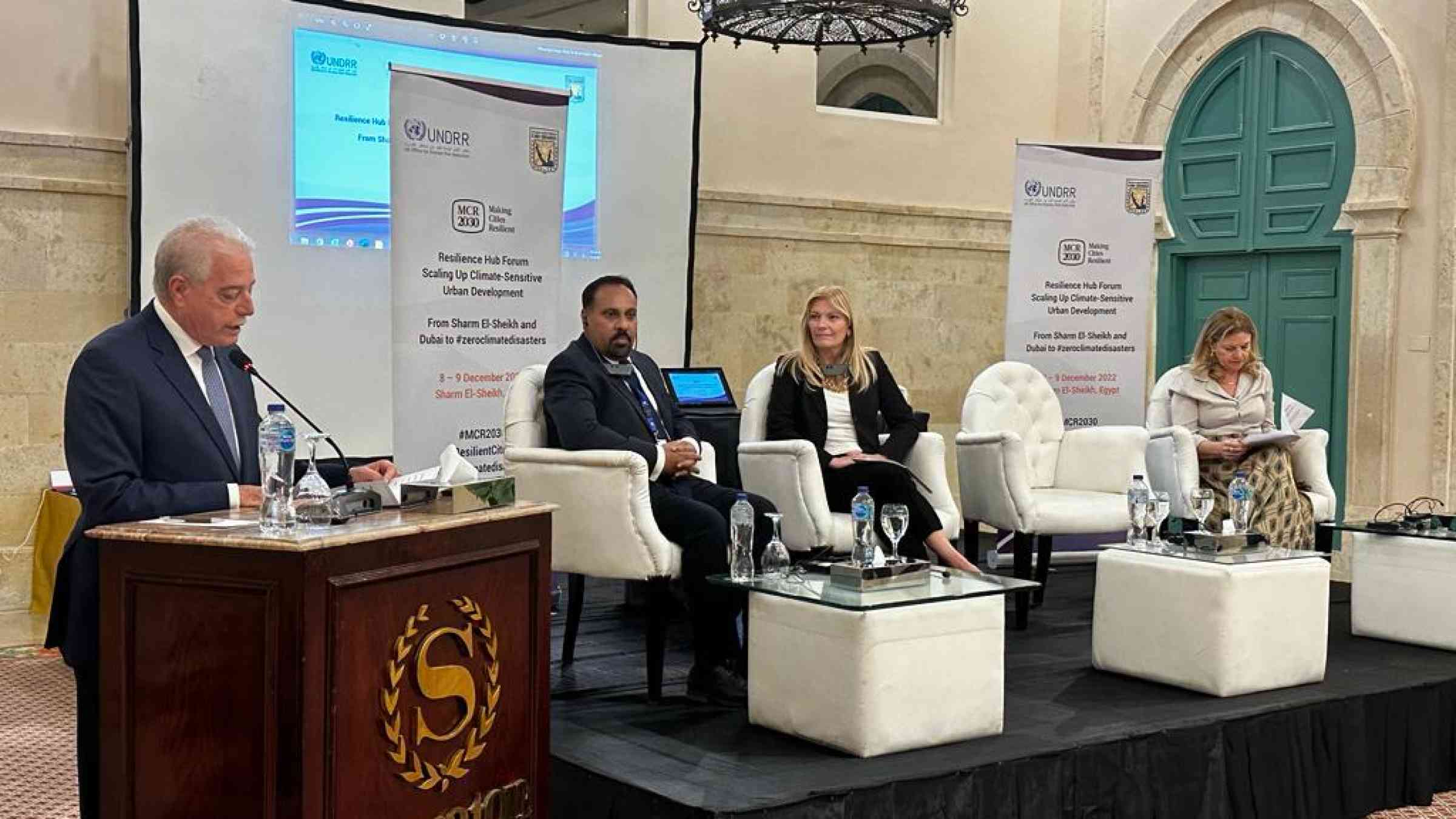From Sharm El-Sheikh and Dubai to Zero Climate Disasters: MCR2030 Resilience Hub Forum Scaling Up Climate-Sensitive Urban Development

Sharm El-Sheikh, Egypt, 8 December 2022, The United Nations Office for Disaster Risk Reduction, Regional Office for Arab States, in collaboration with the Resilience Hub Sharm El-Sheikh, organized an MCR2030 Resilience Hub Forum gathering more than 25 MCR2030 Resilience Hubs and resilient cities representatives that are recognized as global leaders in various disaster and climate-related resilience actions.
The forum saw the participation of representatives from the Resilience Hubs and core partners to develop a stronger, more coordinated, and action-oriented MCR2030 Resilience Hub network and to scale up individual and collective ambition, influence, and action of the Resilience Hubs.
Convening this forum was one of the commitments of Sharm El-Sheikh’s Resilience Hub Action Plan – the host of COP27 and the latest city to be recognized as an MCR2030 Resilience Hub.
“South Sinai governorate adopts several programmes and initiatives to reduce disaster risks, given that cities, regions, and governorates have become essential centers to prepare for climate change and reduce disaster risks,” said the Governor of South Sinai Major General Khaled Fouda.
The forum enhanced the agreement on partnerships on key themes of resilient urban development and forming individual and collective Hub commitments that scale up ambition, resources, and action on climate and disaster resilience.
“Cities around the world are experiencing an unprecedented period of fragility and uncertainty. In particular, climate-fueled disasters are becoming more frequent, intense, and unpredictable,” said UNDRR Director Paola Albrito. “Making Cities Resilient 2030 can ensure that risk-sensitive urban development remains a priority in the wider international development policy agenda.”
The forum aimed to act as a springboard from COP27 – where ‘Sustainable Cities’ was identified as one of the 15 themes most in need of scaled-up global initiatives – towards next year’s COP28, which will be hosted by Dubai, a fellow MCR2030 Resilience Hub.
Having successive COPs hosted by MCR2030 Resilience Hubs presents a strategic opening for Sharm El-Sheikh and Dubai as well as the wider MCR2030 network. It provides an opportunity to influence policy priorities and support scaled-up climate-sensitive urban development that aims to leave no city behind.
The forum highlighted the need for scaling up cities’ resilience in the context of climate risk management and provided an opportunity to enhance city-to-city collaborations and peer-to-peer support along the resilience journey as municipalities around the world are scaling up their ambitions and actions to protect their citizens and local infrastructure assets and systems.
The UNDRR Programme Making Cities Resilient 2030 (MCR2030) has an unprecedented opportunity to support this and ensure that risk-sensitive urban development remains at the heart of the COP process as well as a priority in the wider international development policy agenda. MCR2030 is increasingly focused on supporting local governments to scale up their climate resilience ambitions and actions.
There are now 17 MCR2030 Resilience Hubs: Amadora (Portugal); Barcelona (Spain); Campinas (Brazil); Dubai (UAE); Greater Manchester (UK); Helsingborg (Sweden); Incheon (Rep. of Korea); Makati (Philippines); Malmo (Sweden); Matosinhos (Portugal); Medellin (Colombia); Mexico City (Mexico); Milan (Italy); Potenza (Italy); Recife (Brazil); Sharm El-Sheikh (Egypt); Wroclaw (Poland).
Is your city getting ready? More on Making Cities Resilient 2030